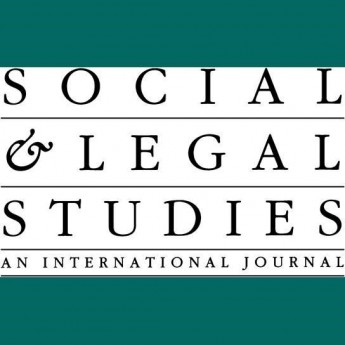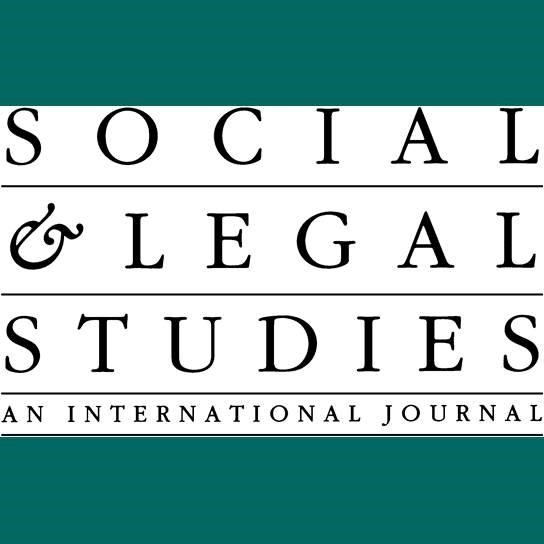Susan Dianne Brophy
Associate Professor in Legal Studies, St. Jerome’s University, Canada
In the footnotes of an article published in 2012, Christopher Tomlins mentions critical legal studies and its “disengagement from critical Marxism” (Tomlins, 2012: 159, note 2). He describes it as an “epistemological break” from materialism, fuelled also by concerns regarding “dismissal by association” with Marxism in general. The occasion for his article was a retrospective on Robert Gordon’s famed essay from 1984, ‘Critical Legal Histories’, and in his own footnote, Tomlins was pointing to footnotes in Gordon’s essay to argue that the canonical piece was “deeply haunted by Marxism”. The inspiration for the approach I adopt in this blog post stems from comments in—and observations on—footnotes from these renowned legal studies authors, both of whom ponder the legacy of Marxist theory when it comes to critical approaches to legal studies.
I maintain that critical approaches to legal studies are well-served when they include the capability to demystify capitalist relations, and I propose the advancement of Marxist legal theory as one way to meet this objective. Although pursuing Marxist-informed analyses of law might seem like an act of conjuring, it would be a mistake to think that this area of scholarship has been dormant for the last forty years, or to presume that it has nothing to offer present day studies. Motivated to bring discussions about Marxism and legal studies in from the margins, to show that it remains a lively area of debate, and to demonstrate its utility as a frame of analysis, I use the space of this blog post to expand on an endnote from my recent piece in Social & Legal Studies, titled ‘Law and Transitions to Capitalism’ (Brophy, 2023). I focus on this endnote because—like Marxist theory in relation to critical legal scholarship in general—it sits on the margins of my analysis, its contribution to the central argument is more instructive than it may appear, and it is the jumping-off point for my upcoming research initiative.
The Margins
Marx famously describes the transition to capitalism as a shift from “direct extra-economic force” to “silent compulsion” (1977: 899). In my S&LS article, I infer three assumptions about law and legal relations from this description: first, that prior to the emergence of capitalism, labour compulsion was more politically and legally direct; second, that the shift to less direct compulsion involves a change to law’s force; and third, that this indirectness leads to law’s effect on economic relations becoming more qualitatively artificial (Brophy, 2023: 627). By tracing these across the works of the early contributors to the transition to capitalism debates, I prove the stubbornness and fallaciousness of the assumptions themselves. My focus in the article is to draw attention to the political and intellectual consequences of remaining inattentive to the three assumptions. But lurking in the shadows is a secondary hypothesis, which hints at a broader campaign.
For the past decade, I have been working on a hunch that the persistence of these assumptions regarding law and legal relations in the transition to capitalism has normalized a degree of path dependency among Marxist legal theorists, even if implicitly. By path dependency, I have in mind an inclination to theorize law and legal relations in ways that reinforce the assumptions associated with the transition to capitalism. During this time, I have held a major concept from Evgenyi Pashukanis in the back of my mind as symptomatic of this dependency. In an undercurrent of my article—made explicit briefly in the tenth and final endnote—there is a reckoning of sorts taking place with this famed Marxist legal theorist from the interwar Soviet era (Brophy, 2023: 643, note 10). His influential concept of the “legal form” is derived from Marx’s account of the commodity form: necessitated by the appearance of labour-power in its commodity form, the legal form emerges as the masking of actual inequality in exchange relations between the sellers of commodified labour-power and capitalist buyers (Pashukanis, 2007: 63). When workers enter the market to sell their labour-power, the transactions proceed as if the two parties are equal, as typified by contractual relations prevalent in private law.
The claim I make in this endnote is a glimpse of the hypothesis that I have been testing in various ways for the past decade. I assert that Pashukanis’ legal form endures because it complements a tendency within critical legal scholarship to pay more attention to the law’s discursive effects instead of law’s relation to the material conditions of production. This was a point of contention during the manuscript review process, when my framing of the legal form was questioned. Although contentious and relegated to the endnotes, I keep it in the published version as a touchstone for scholars familiar with Marxist approaches to law who might wonder how the legal form sits in relation to the article’s thesis, and as a preview of the direction I am taking in other work.
The Evidence
In addition to situating my article in relation to Marxist legal scholarship, the questioning of how I frame the legal form shows that the debates in Marxist legal theory are far from settled. The endnote pushes this further, offering a critical interpretation of Pashukanis that places him in productive – even complementary – proximity with historical accounts of the emergence of capitalism. It may be obscure at first, but the reference to the legal form in the endnote also advances my S&LS article’s thesis in a most instructive manner.
Since Pashukanis adheres to Marx’s basic observation, that the transition to capitalism entails the shift from direct to indirect compulsion, his concept of the legal form reflects the essences of each of the three assumptions. My endnote insinuates but does not elaborate on the implications of this interpretation, namely that his legal form may also cohere with what I refer to as the political and intellectual consequences of the three assumptions. The former is a type of programmatic developmentalism that accompanies a statist, Eurocentric view of the transition to capitalism, and the latter entails the specious neutralization of the relation between labour and compulsion.
The link between law’s formalism and its artificiality is a defining feature of Pashukanis’ legal form, and as he expounds on its genesis, he elaborates on the content of the assumptions, bringing the political and intellectual consequences into sharper relief. His emphasis on exchange relations as the source code for the legal form affords insights about the legal dimensions of developmentalism, specifically pertaining to the qualitative, albeit formal, transformations to legal subjecthood (Pashukanis, 2007: 59). In developmentalist terms, it is possible to see how the accrual of rights by transacting individuals can translate into a programmatic measure of both market penetration and individual freedom, something evinced by Elleni Zeleke’s account of transitions to capitalism (as discussed in my article) (Zeleke, 2019: 142). This emphasis on the formalities of contracting parties also explains how compulsion comes to appear “silent” with the apparent neutralization of the relation between force and labour (Zeleke, 2019: 229). Taken together, these features of the legal form offer further evidence of the veracity of my article’s thesis, and open new channels for me to think about my hypothesis regarding path dependency in Marxist legal scholarship.
The Future
In the past year, I have come to understand path dependency in general, and Pashukanis’ legal form in particular not as obstacles in the advancement of Marxist legal theory. Neither erroneous nor tangential, theories that accommodate the assumptions associated with law and transitions to capitalism are important precisely because they are lacking. As partial accounts, they decode the riddle of law’s mystification in relation to capitalism, helping make sense of the silent yet preponderant force of artificiality and false equivalence, with an emphasis on exchange relations as the primary site of analysis.
However, my concern is that this partial account does not do enough to explain law’s relation to the material conditions of production, and as such, relinquishes labour and compulsion too quickly as a site of actual and ongoing contestation. In this light, partiality and path dependency can be seen as mutually reinforcing tendencies, and although Marxist legal theorists have done well to dissect law’s mystification, more needs to be done to ensure that partial analyses are not an explanatory terminus. On the eve of a six-month research sabbatical where I will be exploring these themes in more depth, I am wary of putting too much stock in law’s artifice and becoming complicit in diminishing the relation that abides between law’s force and the sphere of production.
My endnote on Pashukanis reflects the broader life cycle of Marxist legal scholarship. It is marginal in relation to the main discussion, yet it remains instructive in ways that are not obvious at first glance, and it is worthy of further research. As I move forward with my work, I comprehend the partiality and consequences of past debates, and through genuinely constructive engagement, will continue advocating the importance of demystifying capitalist relations as a pillar to critical legal scholarship.
More by this author
Brophy, Susan Dianne. Law and Transitions to Capitalism. Social & Legal Studies 32(4) (2023): 626–644
Brophy, Susan Dianne. A Legacy of Exploitation: Early Capitalism in the Red River Colony, 1763-1821. UBC Press, 2022
Brophy, Susan Dianne. “Reciprocity as Dispossession: A Dialectical Materialist Analysis of the Fur Trade”. Settler Colonial Studies 9, no. 3 (2019): 301-319.
Brophy, Susan Dianne. “Freedom without Being: Kant’s Corrective as the Philosophical Crux of Agamben’s ‘Homo Sacer’ Series”. European Journal of Political Theory 18, no. 2 (2019): 195-215.
About the author
Susan Dianne Brophy is an Associate Professor in Legal Studies at St. Jerome’s University in Waterloo (Canada). With a background in legal, social, and political thought, her research focuses on critical approaches to law, political theory, and the history of capitalism.
Bibliography
Brophy SD (2023) Law and Transitions to Capitalism. Social & Legal Studies 32(4): 626–644.
Marx K (1977) Capital: A Critique of Political Economy (tran. B Fowkes). New York: Vintage Books.
Pashukanis EB (2007) General Theory of Law and Marxism (ed. C Arthur; tran. B Einhorn). 2nd ed. Piscataway, NJ: Transaction Publishers.
Tomlins CL (2012) What is Left of the Law and Society Paradigm after Critique? Revisiting Gordon’s ‘Critical Legal Histories’. Law & Social Inquiry 37(1): 155–166.
Zeleke EC (2019) Ethiopia in Theory: Revolution and Knowledge Production, 1964-2016. Leiden & Boston: Brill.

